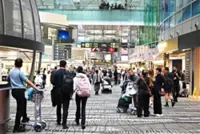THE recent announcement that a committee jointly chaired by senior ministers in charge of security and economy clusters demonstrates that the Malaysian government is serious about creating a balance between continued safety of the general population and survival of the economy.
In the global context, as many countries struggle to deal with the Covid-19 pandemic, this step represents a broader and indeed a rapid response to the crisis. The clearly stated objective of this new committee is to balance the medical risks and rewards of increased production in the current situation. This rapid response is testimony to Malaysia’s current rank of 12th in the World Bank Doing Business 2020 report.





